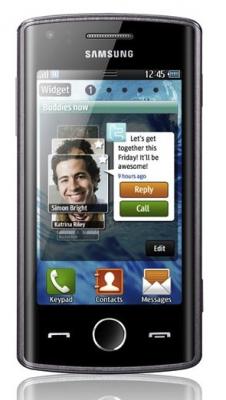Orange Announces First NFC Smartphone for European Markets

BARCELONA – France Telecom-Orange Group today announced plans to introduce its first NFC-enabled smartphone model, the Samsung Wave 578, which Samsung Electronics introduced yesterday.
Orange said it plans to launch the mid-tier smartphone, which runs Samsung’s own Bada operating system, in the second quarter in France, Spain and Poland. It would later expand the rollout of the phone to other Orange branch operators in Europe. The phone supports NFC applications on SIM cards Orange will issue. Other NFC phones will follow.
"The inclusion of SIM-secured contactless capabilities will lay the foundations for Orange to enable a tranche of new services from partners in the future, ranging from mobile payment to ticketing and transportation," Orange said in a statement.
Orange has been among the most aggressive telcos in Europe in promoting NFC. It has already announced plans to roll out SIM cards supporting NFC services to most of its European operators by the second half of 2011 and has stated its intention that more than half of the new smartphone models it buys, perhaps by the end of the year, will support NFC.
In its announcement today, Orange indicated it also plans to introduce NFC-enabled models from LG Electronics and Nokia, among others.
Update: Orange will be deploying the NFC-enabled phones and SIMs even though few NFC services–such as ticketing and payment, are yet available in France or in its other major markets. Part of this strategy is to put NFC-enabled devices and SIMs into the pockets of subscribers in order to encourage service providers to roll out services.
But it is also meant to send a message to handset makers that demand is strong in Europe, especially for NFC phones that support the single-wire protocol standard, or SWP, which enables applications to be stored on SIM cards that the operators issue. That supports one of Orange's main business models, charging fees to service providers to store and manage their applications on the SIMs.
Many of the new NFC phones are expected to carry embedded secure chips that may or may not also support the SWP.
"In our view as an operator, the model based on the SIM card is the best model," Anne Bouverot, Orange Group's executive vice president, mobile services, told NFC Times. With the applications on the SIM, the telco becomes the central point in managing the applications, she said. That could come in handy if the customer has a problem, such as losing the phone, she said. "You have a number of NFC applications on your phone. What are you going to do? Are you going to, one, call the bank? And two, call the retailer? Three, call the transport operator? Four, call Facebook?" End update.
Samsung, at a pre-opening event yesterday at the Mobile World Congress in Barcelona, also announced support for NFC in its planned follow-up to its popular Galaxy S Android smartphone, the Galaxy S II. Samsung said the phone would not be available with NFC in all markets, however. Update: Bouverot said she has been told by Samsung it would be available in France with NFC. End update. But Orange did not announce the availability of an NFC-enabled Galaxy S II today.
The Wave 578 is a touchscreen phone supporting such features as Wi-Fi, GPS, Bluetooth 3.0 and fast data rates. Orange will be able to customize the device with its Orange Signature services, including Orange TV Player, Orange Maps, Orange Messenger and the Orange Application Shop.
Orange said it would also introduce Samsung NFC phones in the in the United Kingdom, which would be launched by Orange UK and its Everything Everywhere joint venture with T-Mobile UK. The telco has announced it will start to roll out NFC payment and other services by early summer with its partner on the project, Barclaycard, the credit card unit of Barclays bank. Today's announcement excluded the United Kingdom in the Wave 578 launch plans for the second quarter.
Orange has been selling Samsung’s S5230 NFC phone, called the Player One in France, at its shops and the handset is being used in an NFC demonstration project in the French city of Nice. Orange and other French mobile operators have sold only about 3,000 of the 2G phones in Nice since last spring.
Update: And they would have sold about that many Player One phones without NFC functionality. While most Orange subscribers probably won't buy the Wave 578 or the smartphones that follow this year because of NFC, handset makers will know the difference.
"It’s a very strong message by our management to the vendors: 'We now have an internal objective,' " Vincent Barnaud, director of contactless solutions at Orange, told NFC Times. "That means it will influence the sourcing of handsets. We’re trying to get the other operators to make the same commitments." End update.












